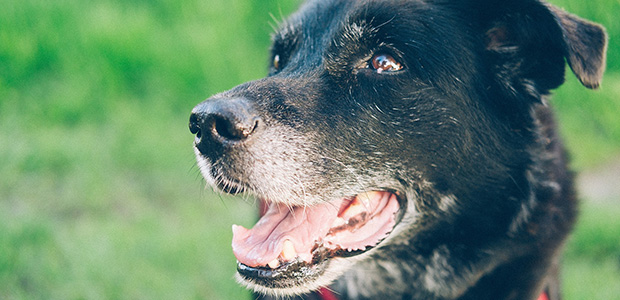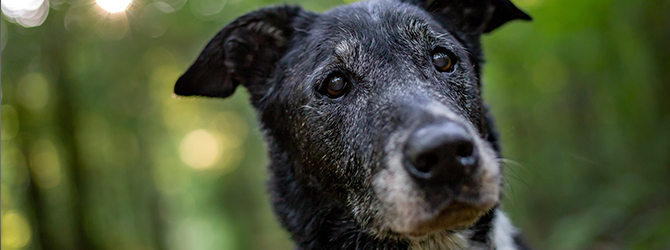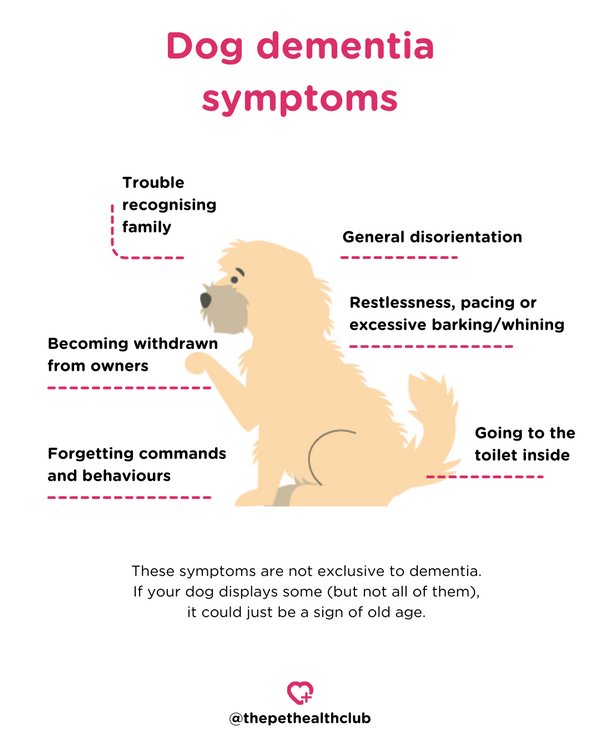Dementia in dogs
First Published: 26/02/2020
Last Updated: 26/04/2024
Canine dementia, also known as canine cognitive dysfunction (CCD), is a condition where a dog’s brain does not function as well as it used to.
Dementia is diagnosed according to behaviour rather than clinical tests, although certain tests may be performed in order to rule out other potential causes of symptoms.
Canine dementia is common as dogs grow older, and the condition is manageable, but it often goes undiagnosed.
What are the signs of dementia in dogs?
Dog dementia symptoms include:
- General disorientation
- Failure to recognise family members or familiar places
- Forgetting commands and behaviours
- Going to the toilet inside
- Becoming withdrawn from owners
- Restlessness, pacing or excessive whining/barking
- Failing to respond when called
- Reluctance to move
These symptoms are not exclusive to dementia. If your dog displays some (but not all of them), it could just be a sign of old age.
If your dog is no longer able to recognise you, or your voice when you call their name, it could be a problem with their vision or their hearing. If they’re reluctant to move, they could be suffering from arthritis.
As an owner, the most important thing to do is to keep an eye on your pet. If something doesn’t look right, contact your vet right away.

Read more: Advice for caring for older pets
Treatment for canine dementia
Dementia in dogs cannot be ‘cured’, but there are definitely actions you can take to improve your dog’s quality of life.
When you visit the vet, they’ll perform a series of checks and tests, including a blood test, to rule out other potential causes of your dog’s symptoms. Once they’ve diagnosed cognitive dysfunction, they’ll draw up a treatment plan. This may include medication, along with a change in diet. Ingredients such as Omega 3 fatty acids and antioxidants as they're known to support brain and mental function.
How do I check if my dog has dementia?
If you're worried about your dog showing signs of dementia, try doing a DISHAA assessment, as recommended by veterinary behaviorist Gary Landsberg. This quick questionnaire will help you evaluate six key areas of your dog’s cognitive health.
| Category | Description | Scoring |
|---|---|---|
| Disorientation | Dogs may seem lost, get stuck in corners, or not recognise familiar people or places. | 0 = No signs 1 = Mild signs 2 = Moderate signs 3 = Severe signs |
| Interactions | Changes in how the dog interacts with people and other pets; they may ignore or act aggressively towards familiar individuals. | 0 = No signs 1 = Mild signs 2 = Moderate signs 3 = Severe signs |
| Sleep cycles | Changes in sleep patterns, such as walking around at night, which can disrupt the household. | 0 = No signs 1 = Mild signs 2 = Moderate signs 3 = Severe signs |
| House soiling | Accidents in the house, indicating a decline in house training. | 0 = No signs 1 = Mild signs 2 = Moderate signs 3 = Severe signs |
| Activity and anxiety | Changes in activity levels and anxiety, like pacing at night or reluctance to go on walks. | 0 = No signs 1 = Mild signs 2 = Moderate signs 3 = Severe signs |
Interpretation:
- Total Score 4-15: Mild canine dementia
- Total Score 16-33: Moderate canine dementia
- More than 33: Severe canine dementia
How to help a dog with dementia?
At home, you can help your dog by keeping them as enriched as possible. Try getting them a few new toys and patiently practising the basic commands. Interacting with your dog will help to keep them on their toes.
Try to keep their home environment as stress-free as possible too. This will help them to feel relaxed and to get some sleep.
Here's a breakdown of some management strategies for dogs with dementia:
- It's important to be patient with a dog suffering from dementia, as symptoms can become worse when they're anxious, stressed, or confused
- Ensure your pet can always find their food, water, and bed. This may involve making adjustments to your home such as blocking off unsafe areas and adding nightlights
- Try to keep walks, meals, and the location of essential items consistent
- Regular exercise (sniff walks as opposed to brisk walks) is still important for dogs with dementia, as are brain training activities to help stimulate their cognitive function
- Keeping your home as stress-free as possible is also important to help your dog feel relaxed and secure
- Dog dementia is a progressive condition, and symptoms are likely to change over time. It's important to adjust the care you provide based on the symptoms at the time
- Ensure your dog wears ID tags and has an up-to-date microchip, just in case they wander off and get lost
- Always keep your senior dog well-groomed to maintain their comfort and hygiene
Read more: What is parvovirus in dogs?
Read more: How to help a constipated dog
Vestibular syndrome discussion
It's important to know the difference between dementia and vestibular syndrome in dogs. Vestibular syndrome affects balance and is often mistaken for dementia. Unlike dementia, it can cause sudden balance problems, head tilting, and unusual eye movements. Recognising these differences helps get the right treatment.
How long can a dog live with dementia?
The life expectancy of a dog with dementia can vary widely. It largely depends on the severity of the condition, the overall health of the dog, and how well their symptoms are managed. Early treatment and proper care are important. But each and every dog is different.
What are the final stages of dog dementia?
In the final stages of dementia, dogs may show severe disorientation, frequent confusion, major changes in sleep patterns, loss of appetite, and difficulty recognising familiar people or places. They might also have more accidents indoors and show less interest in activities they once enjoyed. It's a tough time, requiring extra care and patience.
Does my dog have dementia quiz
- What is a common early sign of dementia in older dogs?
- A) Increased energy levels
- B) Frequent barking
- C) Changes in sleep/wake cycles
- D) Improved house training
- Which management strategy is recommended for dogs with dementia?
- A) Reducing exercise
- B) Avoiding regular veterinary check-ups
- C) Keeping a consistent routine
- D) Introducing significant environmental changes
- What should you do if your senior dog shows signs of house soiling?
- A) Immediately start using doggy nappies
- B) Ignore it as a normal aging process
- C) Take your dog to the vet for an assessment
- D) Reduce the amount of water they drink
- What kind of walks are beneficial for dogs with dementia?
- A) Long distance runs
- B) Sniff walks
- C) Walks in crowded areas
- D) Walks at varying times each day
- How can you support a dog with dementia during the night?
- A) Avoid any interaction to promote independence
- B) Add nightlights and consider an extra walk before bedtime
- C) Keep them in a separate room away from family members
- D) Change their sleeping area frequently to stimulate their mind
Answers: 1) C, 2) C, 3) C, 4) B, 5) B
Need more info on dog dementia?
For more help and advice on dementia in dogs, helping your dog through their elderly years or any aspect of their health and wellbeing, have a chat with your vet.
Find your nearest vet using our Find a Vet page, or speak to a vet online using Online Vets.





.png)
